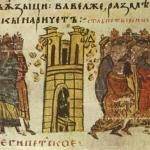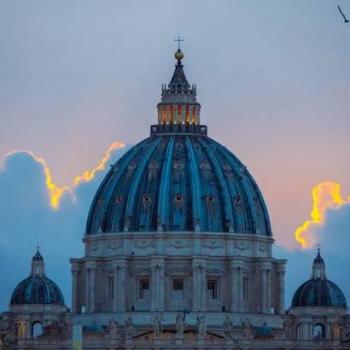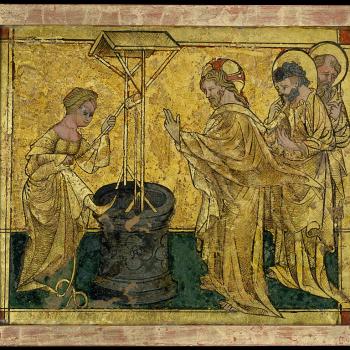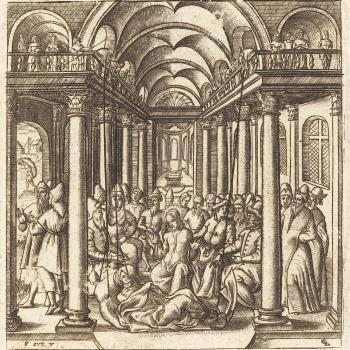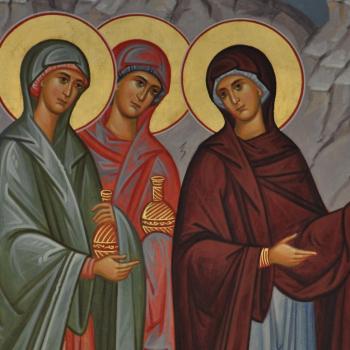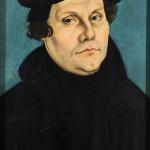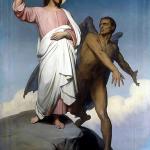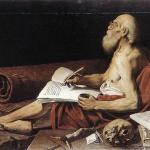Today is the beginning of our salvation and the manifestation of the mystery which is from eternity. The Son of God becomes the Son of the Virgin, and Gabriel announces grace. So with him let us also cry to the Mother of God: Rejoice, thou who art full of grace! The Lord is with thee (Troparian of the Annunciation)
The story of the Annunciation is well known to believers. Mary, a young virgin, was greeted by the archangel Gabriel, being told that she shall conceive a son who will be the messiah, the Son of God. She pondered what she was told and asked how it could happen being that she was a virgin who knew no man. In answer to this question, she was told that she shall be overshadowed by the Holy Spirit, who will then work with her to establish the miraculous conception. Likewise, we are told, Mary was chosen for this unique and great gift of God because she was full of every grace, having made her life a walk with God, who was constantly by her side.
What is often forgotten and overlooked is what prepared Mary to accept what she was told by Gabriel. How was it that she knew he was an angel of God, why did she readily accept what he said to her? The earliest biographies of Mary tell us that she had a long life of preparation, living in and around the Temple in her youth, where she had a special relationship with God and his angels. We are told this was not her first meeting with and talking with Gabriel; she had grown accustomed to being with angels and listening to them, learning from them the will of God. As she grew in age, she grew from grace to grace as she was built up by God to be the seat of wisdom. What is said in Proverbs can be read in part as the history of Sophia in creation, but also, it can be read at the same time as a representation of the development of Mary, as grace gave her the ability to overcome any temptation which came to her, slaughtering her “beasts”:
Wisdom has built her house, she has set up her seven pillars. She has slaughtered her beasts, she has mixed her wine, she has also set her table. She has sent out her maids to call from the highest places in the town, “Whoever is simple, let him turn in here!” To him who is without sense she says, “Come, eat of my bread and drink of the wine I have mixed. Leave simpleness, and live, and walk in the way of insight” (Prov. 9:1-6 RSV).
Eat the bread. Drink the wine. Slay the beasts.
Mary was prepared by God in the Temple; there was something priestly in her up-bringing, as she who became full of every gift of grace, was rendered the one who was to offer to the world the whole of Jesus Christ, body and blood, soul and divinity, by giving him birth. Her life, we are told, was tied with the Temple until the time for her to become the Mother of God. In the Life of Mary attributed to St. Maximos the Confessor, we read:
After a little while, when she was nearing twelve years old there was a precursor and foreshadowing of her Annunciation. She was adorned with all wisdom and righteousness, with fasting and prayer, with humility and tranquility, with fear and love of God. One day, at midnight, she was standing in front of the doors of the sanctuary and offering prayers and supplications to God with a merciful and holy heart. Then behold – an even great and tremendous to hear – a great light shone forth in the Temple, so brilliant that in it the brightness of the visible sun became small and dark. And she heard a voice from the sanctuary that said, “Mary, from you my Son will be born.” When the blessed Mary heard this, neither was she frightened or afraid on account of her youth, nor did she become proud from excessive joy, and she did not tell anyone else, nor did any change occur in her behavior or thinking, but she was amazed at the utterance, as was appropriate.[1]
Mary, we are shown, lived a devout life of prayer in the Temple. She transcended what was expected of a woman in her society, causing concern to the priests in the Temple. They eventually decided she had to be wedded off with a holy man in order to protect someone who was clearly so close to God but also as a way to get he away from the Temple. The priests prayed to God, asking him to intercede and work for the benefit of the people of Israel: Mary, on the other hand, did what the priests tried to do, showing her priestly way of life was more effective, with the fruit of her labor being the glorious Son which was promised by the prophets, proclaimed by the Father, and announced by Gabriel. Truly, her time in the Temple presents to us the one true priestly work of Israel, for in and through her, the law and the prophets was fulfilled.
If, as St. Maximos suggested, Mary truly had such a life with God in the Temple, this would explain why, despite her wonder, how at ease Mary was with what Gabriel had told her. She did not entirely understand the means, which is why she asked about how she would be able to do what Gabriel said, but she understood what was being asked of her, and she readily said yes to it – a priestly yes which spoke for the whole of humanity, a yes to God which then opened up the whole of human nature to the Son so that the Son can take it upon himself and become man. She offered herself as the fruit of humanity, and that fruit was found acceptable; she became the mother of life, the second Eve, who overturned in her priestly work the fall of Adam. She established with Gabriel the foundation for the new covenant:
Maiden and Watcher met each other and conversed in
argument on the matter
until they abolished the conflict between the Lord and Adam.That great strife which occurred amidst the trees
came up for discussion, until it all came to an end; there was
peace.[2]
The Annunciation did not come out of nowhere. Mary had lived the life of grace; she lived a life of wisdom so that it should not be surprising that she would become filled with wisdom and represent it in the world. She is the human face of creaturely wisdom, creaturely Sophia, which is handed over to the Son; he takes the throne of wisdom and sits upon it; what wisdom has built, wisdom has handed over to the Lord in the ultimately priestly act of humanity. Mary gave herself to God on behalf of humanity. God accepted what she offered; taking the gift, built it up. The Son assumed humanity upon himself, lifting it up as he lowed himself to us; he received it, treasured it, and took on that sacrifice and lived it out all his life, with his death on the cross being prefigured in the self-giving of Mary in her life of love dedicated to God. What priests offer at the eucharistic sacrifice, Mary offered by giving birth to Jesus; they follow her and imitate her, allowing the Holy Spirit to come across the gifts and bring forth Christ our God.
Mary lifted up her whole self as a gift to God, and through her, humanity is offered up as a gift to God. When he accepted what was given over to him, her had the angel Gabriel announce to her what was to come. She would be overshadowed by the Holy Spirit, who was to take what had been offered and transform it to become the body of the Son of God. Wisdom built her house and offered to us the table of God.
Queen of the Heavenly Host, Defender of our souls, we thy servants offer to thee songs of victory and thanksgiving, for thou, O Mother of God, hast delivered us from dangers. But as thou hast invincible power, free us from conflicts of all kinds that we may cry to thee: Rejoice, unwedded Bride! (Kontakion of the Annunciation).
[Image=The Annunciation by Guido of Siena [Public domain], via Wikimedia Commons]
[1] St. Maximos the Confessor, The Life of the Virgin. Trans. Stephen J. Shoemaker (New Haven: Yale University Press, 2012), 42.
[2] Jacob of Serug, On the Mother of God. Trans. Mary Hansbury (Crestwood, NY: St. Vladimir’s Seminary Press, 1998), 29.
Stay in touch! Like A Little Bit of Nothing on Facebook


